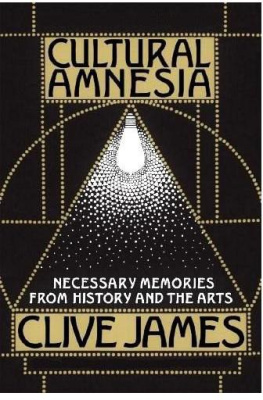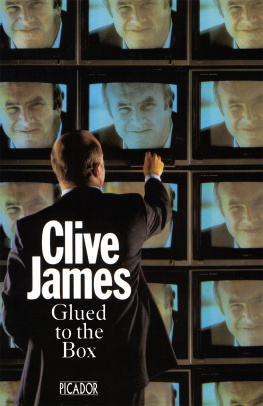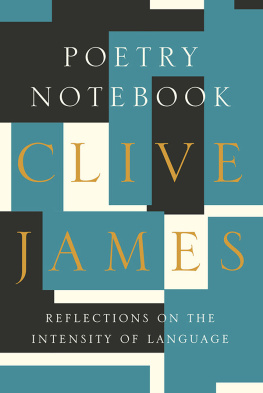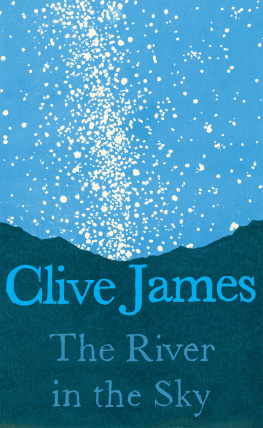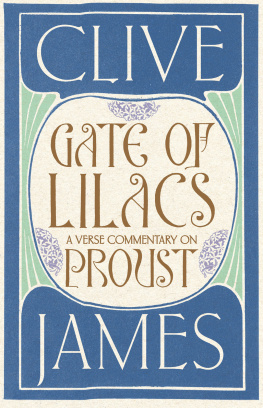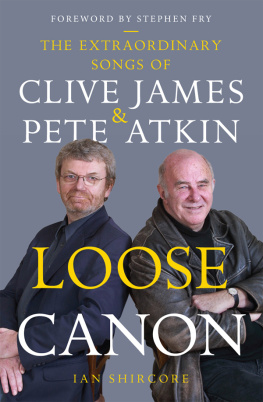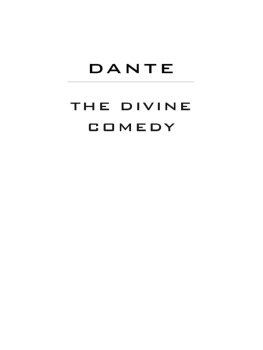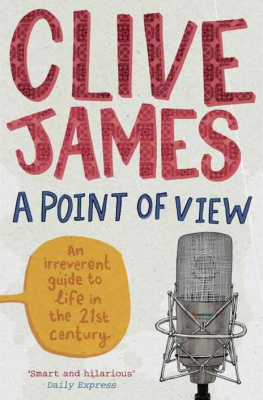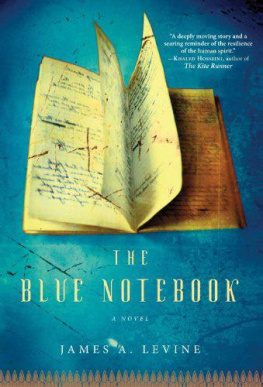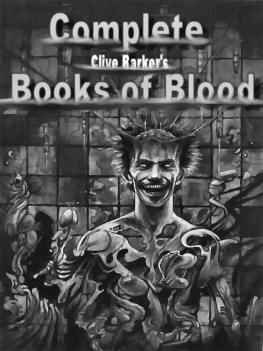Clive James - Play All: A Bingewatchers Notebook
Here you can read online Clive James - Play All: A Bingewatchers Notebook full text of the book (entire story) in english for free. Download pdf and epub, get meaning, cover and reviews about this ebook. year: 2016, publisher: Yale University Press (Ignition), genre: Art. Description of the work, (preface) as well as reviews are available. Best literature library LitArk.com created for fans of good reading and offers a wide selection of genres:
Romance novel
Science fiction
Adventure
Detective
Science
History
Home and family
Prose
Art
Politics
Computer
Non-fiction
Religion
Business
Children
Humor
Choose a favorite category and find really read worthwhile books. Enjoy immersion in the world of imagination, feel the emotions of the characters or learn something new for yourself, make an fascinating discovery.

- Book:Play All: A Bingewatchers Notebook
- Author:
- Publisher:Yale University Press (Ignition)
- Genre:
- Year:2016
- Rating:5 / 5
- Favourites:Add to favourites
- Your mark:
- 100
- 1
- 2
- 3
- 4
- 5
Play All: A Bingewatchers Notebook: summary, description and annotation
We offer to read an annotation, description, summary or preface (depends on what the author of the book "Play All: A Bingewatchers Notebook" wrote himself). If you haven't found the necessary information about the book — write in the comments, we will try to find it.
Play All: A Bingewatchers Notebook — read online for free the complete book (whole text) full work
Below is the text of the book, divided by pages. System saving the place of the last page read, allows you to conveniently read the book "Play All: A Bingewatchers Notebook" online for free, without having to search again every time where you left off. Put a bookmark, and you can go to the page where you finished reading at any time.
Font size:
Interval:
Bookmark:
Play All
Clive James
Play All
A BINGEWATCHERS NOTEBOOK

Copyright 2016 by Clive James.
All rights reserved.
This book may not be reproduced, in whole or in part, including illustrations, in any form (beyond that copying permitted by Sections 107 and 108 of the U.S. Copyright Law and except by reviewers for the public press), without written permission from the publishers.
Yale University Press books may be purchased in quantity for educational, business, or promotional use. For information, please e-mail (U.K. office).
Designed by Sonia L. Shannon.
Set in Fournier type by Integrated Publishing Solutions.
Printed in the United States of America.
Library of Congress Control Number: 2016930355
ISBN 978-0-300-21809-1 (hardcover : alk. paper)
A catalogue record for this book is available from the British Library.
This paper meets the requirements of ANSI/NISO Z39.48-1992
(Permanence of Paper).
10 9 8 7 6 5 4 3 2 1
To Prue, Lucinda, and Claerwen
WATCHERS OF THE AVALANCHE
And to Farran Nehme, Alice Gregory, and Meghan ORourke
KIDS FROM BROOKLYN
And to Marina Hyde, Hadley Freeman, Catherine Shoard, and Zoe Williams
SHAKERS OF THE SUPERFLUX
And to Simon Schama and Jonathan Meades
KINGS OF THE WALKING TALK
And to James Gandolfini and Philip French
GHOSTS AT THE FEAST
And to Jonny Grove, Maia Grove, and Benjamin Beresford
IMAGE CONSULTANTS
And to Steven Bochco, Carl Reiner, Richard Benjamin, and Peter Bogdanovich
PRINCIPAL ELDERS
Und doch darf ich nicht klagen. Es tut so wohl noch einmal Ja zu sagen.
KURT TUCHOLSKY
And yet I mustnt complain. Its so good to say Yes for once.
FOR CRITICAL ADVICE on my text, I should thank Claerwen James, Lucinda James, Deirdre Serjeantson, and David Free. The opinions are still my own, but some of them have become less intransigent through having been hauled over the coals.

APART FROM A FEW PARAGRAPHS of a piece about Mad Men which first appeared in the Weekend Australian Review in 2009, and perhaps a few opinions from a piece about The Pacific that appeared in the Times Literary Supplement in 2010, everything in this book was written in these recent years of my illness, while it went on happily refraining from being fatal. With memories in my head of how Twin Peaks had once held my attention with its long story even though I could barely understand its briefest episode, I sat down with my younger daughter Lucinda to watch a big box of NYPD Blue right through. We had seen it all before, but as in a glass, darkly. Our recurring discussion of the magnificence of Andy Sipowicz set a tone that struck me with its potential for one day becoming a useful critical style. This tone was abetted by reports of water-cooler conversations that Lucinda brought home from her work as a civil servant, and from dinner table conversations in my elder daughter Claerwens kitchen, where I found myself matching her admiration for Starbuck in Battlestar Galactica with mine for Wilma Deering in Buck Rogers in the 25th Century. It occurred to me, perhaps because of my medicated state, that a new critical language was developing itself to deal with the onrush of creativity coming to us in the form of box sets: a system of distribution that still strikes me as something new, even though it is already being overtaken by systems that download material directly into the computer. By the time this book is published, the DVD might be as obsolete as the dodo. But the number of shows, if not their quality, can only go on increasing: and the way we talk about them can only become more compulsively attentive than it was a few years back, when I first noticed that Allison Janney in The West Wing was getting the kind of detailed analytical praise that Maria Callas used to get when she sang in Tosca at Covent Garden. I could hear the same fluent critical inventiveness from the discussion groups of writers on Slate when they talked about the first few episodes of Orange Is the New Black: some of the writers sounded as if they were having at least as much fun talking as they did writing.
Since I have always thought that the spontaneous response of the delighted consumer outranks the more ponderous consideration of the professional student of culture, I took this to be a welcome development, and tried to hang on to the sense of irresponsibility when I sat down to write. Though my tone is conversational, however, I have tried as always to stick to the fixed grammatical rules on which free expression depends, and I would have written boxed sets for box sets if the neologism had not already become standard. Back in the eighteenth century, I might have agreed with Swift that the word idololatry was etymologically correct and that idolatry was a barbarism to be staved off at all costs. We would have lost, however: and today there is a good reason for at least acknowledging popular usage when talking about popular culture. Not to do so sounds too aloof. Sometimes the subject is grim, but we wouldnt even be discussing it if its presentation were not entertaining. When Deirdre Serjeantson gave me a box set of Veronica Mars for Christmas, I wondered briefly what Theodor Adorno would have said on the subject of American schoolgirl detectives, but after watching a few episodes I realized that I didnt give a damn what Theodor Adorno would have said: I only wanted to see more of what Kristen Bell was doing with the title role. Throughout the text, I have taken care to name the actors, who should always, I think, be given at least that much reward for their work. All too often we think of them as having chosen their roles. They hardly ever get that chance. In that regard we viewers live in a dream world, being guided toward reason by people who live in a world of harsh reality.
Cambridge, 2016
Play All
IT SEEMS AN AGE AGO NOW, and it was. Between 1972 and 1982 I wrote a regular weekly column about television for the London Observer, and by the end of my stint I preened myself as being fairly clued up on the subject. I signed off with a confident prediction that although the American production centers, having fed their shows to the networks, might go on picking up secondary earnings by flooding the world with stuff priced low because it had already made a profit in the home market, the droll sarcasm of the desk sergeant Phil Esterhaus (Michael Conrad) in Hill Street Blues would be about as clever as their effort would ever get. Seriousness, sophistication, and the thrill of creativity could be supplied only by the older, wiser, more mature nations. For a couple of decades it looked as if I might be right, and then the American cable channels, arising out of nowhere, suddenly outflanked the networks, which, in their turn, were obliged to raise their game. American shows for export increased their status from merely ubiquitous to unbeatably attractive, and then the advent of the box set dramas changed the game completely, to the extent that the old world had to start competing or be left out.
But to compete was hard: the American product was so good. This unexpected upsurge was a replay, in the form of art, of what the Americans had done in World War II, for which, at the beginning, they had very little military equipment, and by the end, after only a few short years, they were building a new aircraft carrier every fortnight and had developed the B-29 pressurized high-altitude bomber, not to mention the atomic bomb. None of that had been predictable either, but the thought did not console me when, at the millennium, I looked back on my confident pronouncements of the early 1980s and lashed myself for having so completely failed to guess what might happen to the American television output later on. It was a punishing example of what ought to be a critical rule: if you cant quell your urge to make predictions, dont make them about the future.
Next pageFont size:
Interval:
Bookmark:
Similar books «Play All: A Bingewatchers Notebook»
Look at similar books to Play All: A Bingewatchers Notebook. We have selected literature similar in name and meaning in the hope of providing readers with more options to find new, interesting, not yet read works.
Discussion, reviews of the book Play All: A Bingewatchers Notebook and just readers' own opinions. Leave your comments, write what you think about the work, its meaning or the main characters. Specify what exactly you liked and what you didn't like, and why you think so.

